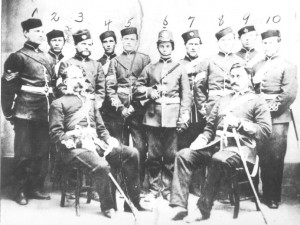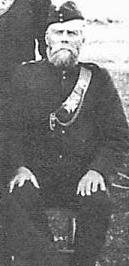Beginning in the 1820’s and throughout the nineteenth century, the men of the village regularly demonstrated their loyalty to “Crown” and “Country”. During the 1860’s, following in the tradition of many of their fathers and grandfathers (who were veterans of the War of 1812), Richmond’s young men volunteered to defend their land against the threat of an American based invasion by the Fenian Society. They formed one of the nine companies of the 43rd Battalion of Infantry commonly called the Carleton Blazers. During the year, this militia company (Company #5) would drill at home and then gather with the rest of the Battalion in a summer encampment. One can only imagine the excitement, resolve and pride felt by most of these men, mainly farmers and/or their sons. (for an exception to this positive response see Murder on the main street) The following sympathetic description of an encampment appeared in the Ottawa Citizen on July 3, 1868. The article tells us about life in the militia, but equally important, it describes the attitude of the wider rural community.
(The following was transcribed from microfilm many years ago and has not been checked against the original. I have added italics for sections dealing with Richmond and added the initials of paymaster Lyon from his signature on a payroll document. The last five paragraphs appeared as one paragraph in the transcription but have been divided for ease of reading. M.S.)
Ottawa Citizen July 3, 1868
The Carleton Volunteers
Our gallant friends of the 43 Battalion have now fairly settled down to their work, and a visit to their camp at Sandy Hill will amply repay any rambler who may stroll thitherward during these fine summer evenings. The site selected for the camp is the elevated plateau which lies between the Government Rifle Range and Daly Street, on the bank of the Rideau. A more judicious selection could not have been made in the vicinity of the city, the situation being cheerful, airy, and well drained, while the level of the ground affords abundance of space for parade and drill purposes, besides the necessary room for the tents. Immediately to the left of the camping ground is the Government Rifle Range and in its rear the Rideau River, a fine view of which and the Township of Gloucester beyond can be had from almost all points on the ground.
The main body of the tents are pitched about the centre of the ground, in parallel rows facing towards the city, those of each Company forming, as it were, a separate street.
Before noticing the encampment of the various companies, we may turn for a moment to the Officer’s Quarters, comprising six tents, situated to the extreme left of the field, immediately overlooking the Rifle Range. A sturdy flag pole bearing the glorious old Union Jack marks the headquarters of the corps, and in several tents about are stationed the Commissioned Officers, who are already trying (to see) how comfortable they can manage to fit things up in lodgings of limited space, and destitute of such things as cupboards and shelves.
The staff of the Battalion consists of Lieut. Col. Powell, Major Bearman, Major Scale, Adjutant Falls, Paymaster Lyon of Richmond (R.E. Lyon), Assistant Surgeon McDougall of Metcalfe, Quarter Master D.T. Brown, Sergeant Major Stewart, and Quartermaster Sergeant Stewart.

from Bytown or Bust
A short distance from these quarters, and nearest to the river, a long pine table, covered with a canvas awning, serves the purposes of a regimental mess room, and not far from it the chef de cuisine has his indispensable establishment.
Returning to the centre of the ground we are soon again among the Company quarters. Nearest to the city lies the Bell’s Corners’ Company, No.1, under the command of Capt. Corbett and his subaltern Lieut. McDougall. The Company musters on the camp 52 men, including non-commissioned officers and bugler.
Immediately in rear are the tents of the Huntley men, Capt. Holmes’s Company; the other officers being Lieut. Houston and Ensign Nesbitt. The Company turns out 51 men of all ranks.
Next comes Company No. 3, from Metcalfe, under command of Capt. Ira Morgan, Lieut. Hannah and Ensign Carson, turning out 47 men, three sergeants and a bugler.
The next street is occupied by the North Gower Company, the officers of which are Capt. Johnson, Lieut. Connolly, and Ensign Tremble. The Company parades 50 men of all ranks.
Capt. Maxwell’s Company, from Richmond follows with 44 men and three sergeants. The other officers are Lieut. Good and Ensign Hill.

n.d.
from Bytown or Bust
No. 6 Company, from Goulbourne, comes next – also 44 strong – its officers being Capt. Garvin, Lieut. Henderson, and Ensign Tubman.
Last but one we have the contingent from Manotic in the shape of Capt. Davidson’s Company, parading 43 men all told, besides its officers, Capt. Davidson and Lieut. Martin.
In rear of all lies Company No. 8 from Vernon, 45 strong, under Capt. Gregor, Lieutenant Grant and Ensign Crearar.
Somewhat in rear of the Company’s quarters a shed has been erected to serve as a Commissariat store and canteen, and from it the deputies of the energetic Quartermaster are continually hard at work dealing out the required articles of consumption to the hungry and thirsty ones about. Everything provided for the men, we must say, is of the best quality, and served out in no stinted style, and in quantity considerably exceeds per man the Government standard for rations.
The articles daily furnished the Companies consists of beef, mutton, tea, coffee, sugar, milk, bread, potatoes and other vegetables.
The officers are certainly leaving nothing undone to promote the comfort of the men, who seem to fully appreciate their liberal and thoughtful conduct.
The tents used by the Battalion are not the Regulation bell tents, but the large ridge tents in ordinary use among civilian Company parties and are the property of the Battalion having been purchased by the Staff Officers for the corps at a personal expense of $67.00 a fact sufficient in itself to show the interest they take in, and the sacrifice they are willing to make for the welfare of the regiment. As for the men nothing could exceed the cordial good feeling and satisfaction that pervaded in every Company. Camp life, of course, has its inconveniences at the best of times and it is trying to a man’s patience to have to stow away all his things in a small portion of a small tent, with no place to put so much as a pipe upon. Practiced hands soon learn how to surmount these difficulties, and necessity has even in these few hours done much to sharpen the invention of the 43rd. Such minor troubles are the only sources of complaint we could hear in the camp. An occasional pot of burnt soup caused now and again uncomplimentary epithets be hurled at the amateur cook who had caused the mishap.
The physique of the Battalion need not fear comparison with any body of men though they would be none the worse for a good share of “setting up”. From all we could see and hear they have assembled with an earnest determination to make the most of their time, and in such a frame of mind cannot fail to make great improvements in their drill. To one thing we would venture to direct their attention, and that is, to a care of those little points of dress and ceremony which Volunteers are sometimes apt to neglect. While at soldier’s work the Volunteer should strive to be as much like the real soldier in every point as possible, and the nearer he comes up to that point the more credible for him. We are glad to see that many of the Carleton men fully appreciate the attention to these matters. Some of them when about the town yesterday presented an appearance of which they and their officers might well feel proud, and we hope that those who may have before given no thought to such matters will follow the example thus set them.
The officers of the Battalion have engaged Gowan’s Band to play at every parade during the time the men are in camp. The Battalion was yesterday visited by the Adjutant General, who expressed himself highly pleased at all he saw.
The strong muster which all the companies have made shows that the spirit of the men of this section is not a whit less than in former years, and that they have the sympathy and respect of the community is evident from the readiness displayed by the farmers all through the County to forward them as comfortably as possible to the Capital. The Osgood men were sent in in wagons provided for them by the farmers and on hearing of their approach, the directors of the Billings Bridge Road, sent with all commendable speed to inform the toll keepers that no tolls were to be extracted from them.
During the last two evenings the men have been about the city in great numbers enjoying themselves, and nothing can exceed the soberness and propriety of their conduct. We hope that their whole period of duty will prove a pleasant one, and that they will all be able long to look back with pleasure on the days of their Camp on the Rideau.
